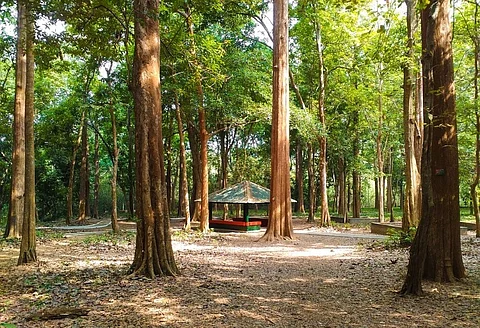

Kerala Forest Department's move to plant teak wood trees in the forest regions of Mananthavady in Wayanad district of Kerala is getting a lot of flak from environmentalists. The department has proposed to clear-felling (cut and remove trees) 81 hectares of forest area that comes under Begur range of North Wayanad Forest Division to plant teak trees.
Wayanad Prakruti Samrakshana Samithi, an NGO, has protested the move, claiming that monoculture (cultivation of a single crop) tree plantations will only harm biodiversity and will not serve the purpose of a forest.
The government’s earlier initiatives of planting teak trees in forest areas for the production of timber has been criticised by environmentalists over the last many decades.
“Teak is an indigenous species but when it is planted in large scale, other plants might not grow in the area. As these trees absorb underground water, the water sources in the area would dry up. Wildlife cannot sustain in monoculture plantation. As a result, animals will come out from these forest areas and it could lead to an increase in man-animal conflict,” N Badusha, president of Wayanad Prakruti Samrakshana Samithi, told TNM.
The proposed land for clear-felling was planted with teak wood in 1958. The trees in the forest area were cut and later the area was set on fire before planting the teak and some other timber-based trees. "The biodiversity was totally destroyed then,” says Badusha.
But the area eventually evolved into a natural forest. Today, the area hosts many indigenous species of plants and a variety of wildlife. “In a survey conducted here, 280 bird species, 178 butterflies and rare species of frogs were found in the forest land. This division of forest also have wild elephants, tigers, different species of snakes, giant Malabar squirrels and deer," Badusha said.
“Now, after 50 years, when the forest regained its original form, once again, they plan to do this," laments Badusha, adding that Kerala cannot afford losing more natural green cover.
He also recounts how forest department planted eucalyptus and acacia trees by destroying several forest areas in Kerala, including those in Idukki district, which later proved to be a mistake as those areas faced an extreme shortage of groundwater.
Kerala State Action Plan on Climate Change (SAPCC), prepared by the Department of Environment and Climate Change (DoECC) in 2014, says that forest cover in the state has reduced from 44% in 1905 to 28% in 2010.